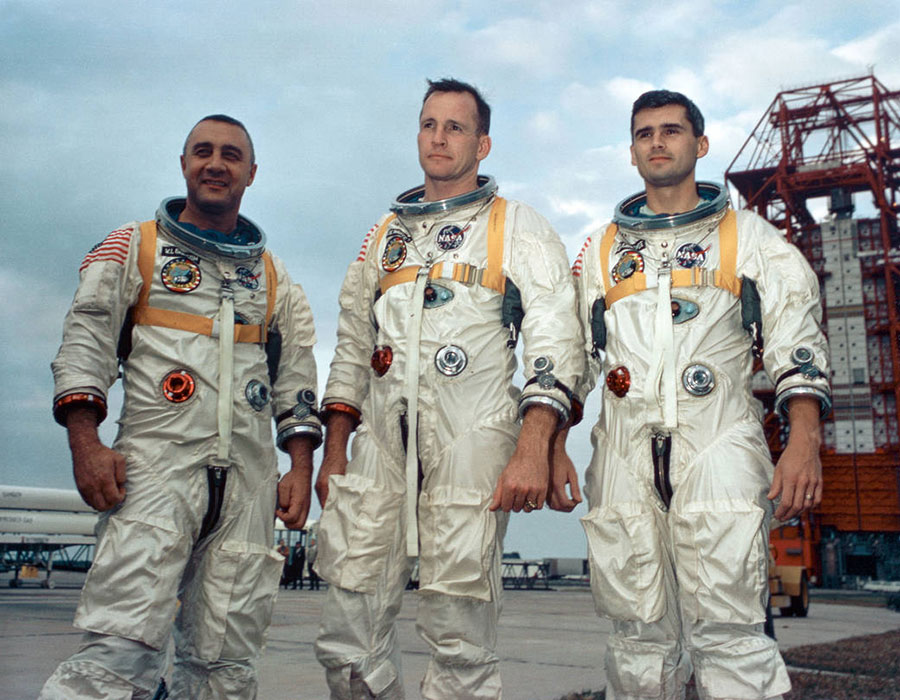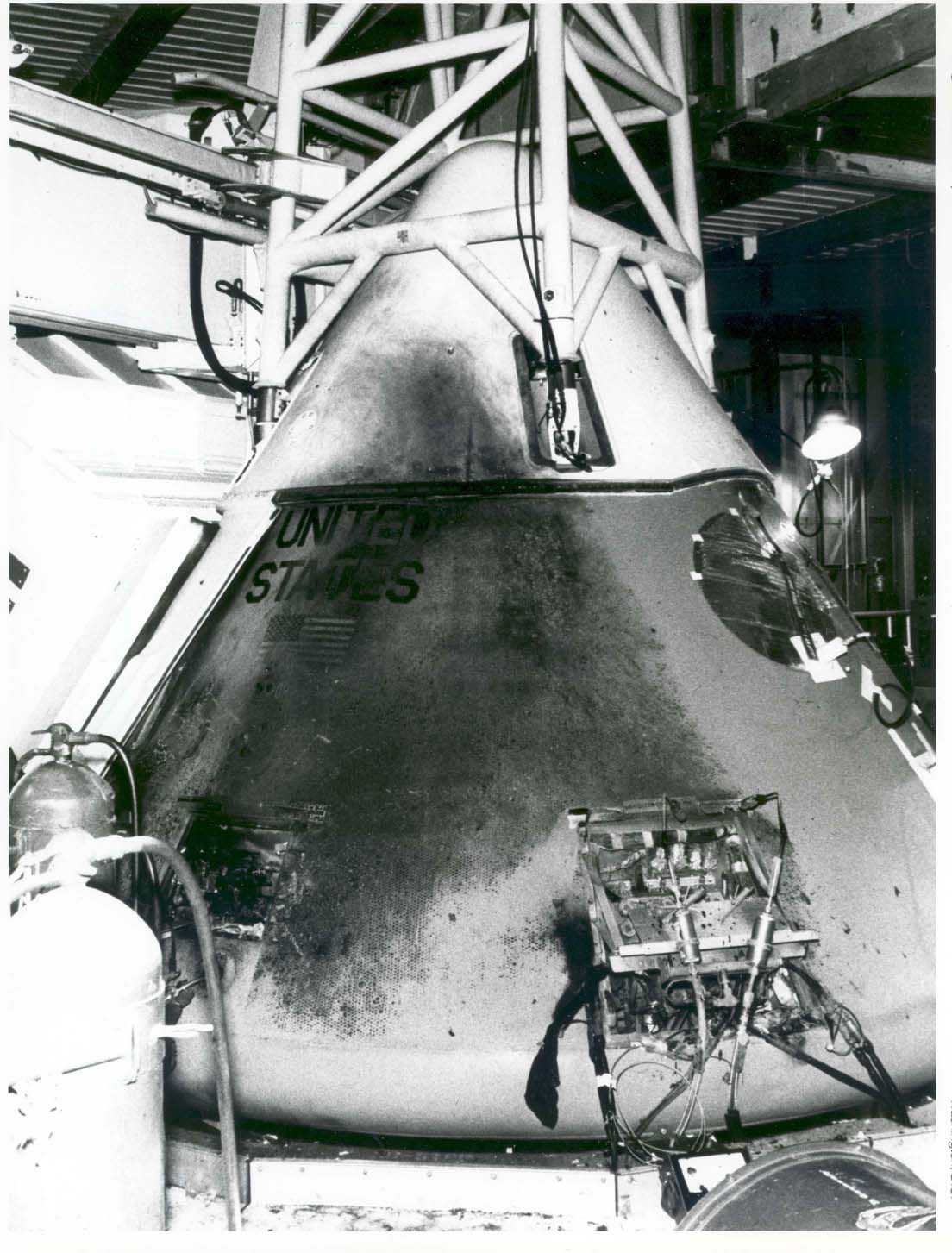
Can You Solve This Apollo 1 Spacesuit Mystery? Universe Today
Roger Bruce Chaffee ( / ˈtʃæfiː /; February 15, 1935 - January 27, 1967) was an American naval officer, aviator and aeronautical engineer who was a NASA astronaut in the Apollo program . Chaffee was born in Grand Rapids, Michigan, where he became an Eagle Scout.

SNAFU! Blast from the past. Apollo 1 crew pray for a safe capsule...
The first mission was what came to be known as Apollo 1, though, at the time, its official designation was AS-204. "AS" stood for Apollo Saturn and included the Apollo Command Module, the Service.

History's 10 Worst Engineering Disasters Part 1
Apollo 1, initially designated AS-204, was planned to be the first crewed mission of the Apollo program, [1] the American undertaking to land the first man on the Moon. It was planned to launch on February 21, 1967, as the first low Earth orbital test of the Apollo command and service module.

Editorial Apollo 1 tragedy's lessons must not be
NASA Portrait of the Apollo 1 prime crew for first manned Apollo space flight, Edward H. White II, Virgil I. 'Gus' Grissom, and Roger B. Chaffee. The "plugs-out" test, during which the module.

Charred flight suits of Apollo 1 astronauts r/spaceflight
Right: The three hatches from the Apollo 1 spacecraft are on display at the Apollo/Saturn V Center at NASA's Kennedy Space Center in Florida. Credits: NASA. After the conclusion of the investigation, on July 9, 1967, the Apollo 1 CM was transported to a long-term secure facility at Langley as directed by the review board.

The Apollo 1 Launchpad Fire Remembering Grissom, White and Chaffee
NASA This high angle view shows the Apollo spacecraft Command Module for the AS-204 mission (later renamed Apollo 1), looking toward -Z axis, during preparation for installation of the crew.

Apollo 1 All 3 Bodies
Fifty years ago today, at precisely 11:00 a.m. ET, astronauts Gus Grissom, Ed White and Roger Chaffee entered the Apollo 1 spacecraft on launch pad 34 at Cape Kennedy. They weren't planning on.

Apollo 1 Deaths WHAT REALLY HAPPENED YouTube
NASA Apollo 1 Tragedy Jan. 27, 1967, tragedy struck on the launch pad at Cape Kennedy during a preflight test for Apollo 204 (AS-204). The mission was to be the first crewed flight of Apollo, and was scheduled to launch Feb. 21, 1967.

NASA honors astronauts who died in the apollo 1 tragedy
last updated 26 January 2021 The Apollo 1 crew, from left to right, Roger Chaffee, Ed White and Gus Grissom. (Image credit: NASA/JPL-Caltech) The Apollo program changed forever on Jan. 27,.

İnsanlığın uzay yolculuğunda sancılı başlangıç; Apollo 1 Kazası
The nation's Moon landing program suffered a shocking setback on Jan. 27, 1967, with the deaths of Apollo 1 astronauts Virgil I. "Gus" Grissom, Edward H. White, and Roger B. Chaffee in a flash fire aboard their spacecraft during a ground test on the launch pad. America honored the fallen heroes in funerals with full military honors.

What the Deadly NASA Apollo 1 Capsule Accident Taught Us The Drive
News Archival 6,748 Apollo 1 Photos & High-Res Pictures Browse 6,748 authentic apollo 1 photos, pictures, and images, or explore apollo 11 or moon landing to find the right picture. Showing Editorial results for apollo 1. Search instead in Creative?

Apollo 1 Crew Photos Apollo News
Apollo 1 was supposed to be Roger Chaffee's first spaceflight. The 31-year-old naval aviator and test pilot had replaced Donn Eisele as pilot after Eisele dislocated his shoulder during.

Photos Apollo 1 crew and fire in 1967 National
Left: Apollo 1 crew of Roger B. Chaffee, left, Edward H. White, and Virgil I. "Gus" Grissom suit up in the Flight Crew Training Building. Credits: NASA. Right: Grissom, front, White, and Chaffee, still inside, leave the Flight Crew Training Building on their way to Launch Complex 34 to meet with the media. Credits: Courtesy Armando Oliu

‘Got a fire in the cockpit!’ The Apollo 1 tragedy that killed three
Ms. Grissom said this year's ceremony was probably her last. It coincided with a NASA tribute exhibit about Apollo 1 at the Kennedy Space Center, which she, like many, thought was long overdue.

Photos of the Apollo 1 Fire NASA's First Disaster Space
Final preparations are under way at Cape Canaveral in Florida for a milestone mission to put a US lander on the moon, an achievement not seen in more than 50 years since the end of the Apollo.

Apollo 1, tragedy, January 27, 1967 NASA INFO Cape Kenned… Flickr
Impact craters are caused by rocks ranging in size from dust particles to a few kilometers in diameter that collide with a planetary body's surface at incredible speeds. The result is not only a.